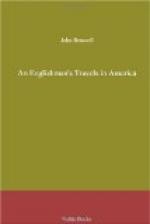of all denominations as a direct infringement of the
original intention of the Act, which they maintain
was for the purpose of aiding the Protestant cause
at large against the innovations of the Roman Catholic
Church. Much ill-will and sectarian prejudice
are the natural consequence; in fact, the Act is a
perfect apple of discord throughout the Canadas, and
has engendered more animosity and resentment than
any one legislative act, sanctioned by the Home Government,
since the acquisition (if so it can he called) of
the country. It is an indelible disgrace to England,
that such a manifestly bigoted and narrow-minded policy
should have been allowed to continue so long; and I
am fully persuaded that this enactment, which, there
is little doubt, originated in sectarianism, perpetuates
a degree of rancorous feeling in the minds of people
there, that is sufficient to account for the disaffection
and tendency to rebellion that ever and anon displays
itself; and that to remove this blister, and allow
the application of these funds to all creeds alike,
would be to restore peace, and convert doubtfully-affected
communities to allegiance. If there is one consideration
that ought to weigh in the minds of the British as
a people, to endeavour to rivet the affections of
the Canadians, more than another, and prevent the
ultimate cession of that country to the Americans,
it is, that the dependency affords now the only asylum
for those persecuted outcasts of humanity, the slaves
of the United States. Canada, the land of freedom,
is associated in their minds with paradisaical thoughts
of happiness—and many a heart-stricken creature
in the Southern States of America, as I had many opportunities
of ascertaining, toils on in content, with “Canada”
in view, as the ultimatum of his hopes and the land
of his redemption.
The population of Buffalo is fluctuating, owing to
the vast number of emigrants who are constantly arriving,
en route to Ohio, Michigan, and the far West.
It averages in population, about ten thousand.
The city is not of great extent, and consists in chief
of one principal thoroughfare, called Maine-street,
which is wide, the lower part terminating at the water’s
edge, along which spacious stores are erected for
the reception of wheat and goods in transit. The
harbour is formed by an arm of Lake Erie uniting with
Buffalo river. Here are always congregated a
large fleet of steamers, many of them of leviathan
dimensions, which are employed in running to and from
Detroit, in Michigan, and the intermediate ports,
as well as in the Upper Lake trade. Being quite
a depot, Buffalo bids fair, ere the lapse of many
years, to be the grand emporium of the West. The
public buildings do not deserve much notice; the Eagle
Theatre, a joint-stock concern, being the only building
of much interest. There are, however, several
spacious hotels, and two or three banks, that boast
some architectural merit, although much, I believe,
cannot be said as to their stability. The lateral
streets are rather obscure, and, not being regularly
built upon, give the city an unfinished look.
These are, however, dotted here and there with chateaux,
having good gardens well arranged. The Niagara
Railway station is situated to the left of Maine-street,
about half-way up that premier thoroughfare.




